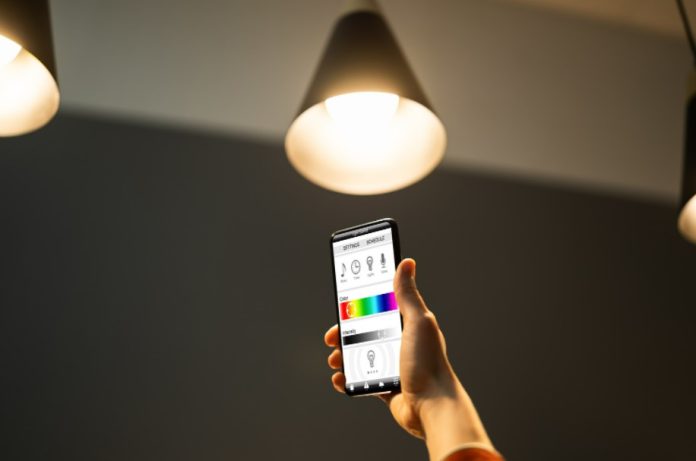Table of Contents
To say that home lighting technology has come a long way over the years would be something of an understatement. Recently, we’ve seen the near-total transition from inefficient incandescent lighting to super-eco-friendly LEDs across most households. Utilising exponentially less energy than additional bulbs, LEDs are better for the environment and much cheaper to operate.
But while all this has been going on, the next big movement in home lighting technology has been gaining momentum. Once something of a niche curiosity, smart lighting control systems are making their way into more homes and businesses worldwide than ever before.
Accessibility and affordability are playing a part in the movement, driving down costs and opening up the option to a much bigger audience. As is the simplicity of installing and integrating today’s most sophisticated devices.
What is a Smart Lighting Control System?
Smart lighting control systems can be set up in a limitless range of configurations. Though in all instances, the basic premise is largely the same.

These smart-systems enable centralised control of all the lights around the home integrated into the system. Advanced lighting controllers – like Evvr’s Zigbee 3.0 In-Wall Smart Relay Switch – can be installed as quickly and easily as any conventional light switch. After which, they can be interacted with via a connected mobile device, or by using voice commands with a smart home assistant (like Amazon’s Alexa).
At its core, smart lighting control systems are designed to enable the user to control and interact with the lights around the home with much greater precision. Along with turning lights on and off, a smart lighting control system can be used to adjust lighting intensity, change the hue and colour of the light emitted, set up timing cycles and more.
What Are the Benefits of Smart Lighting Control System?
All of which is impressive on paper, but how do these features translate to tangible benefits in the real world?
What kinds of advantages does a smart lighting control system bring, over and above the more conventional light switch?
1. Remote Control
Firstly, smart lighting converts the smartphone in your pocket into the ultimate lighting control panel. Using a corresponding app, you can interact with your lighting control system in a variety of ways at the touch of a button. Depending on the type of system you install, it may even be possible to control your lights remotely from anywhere in the world.


Smart lighting is all about taking more precise control over the way you illuminate your home. Controllers can be linked with interior and exterior lights all around the home or maybe a home office, which can subsequently be controlled from a centralised hub (such as a smartphone app) or even by voice control using a smart home assistant (like Amazon’s Alexa).
2. GPS Activation
There are even some smart lighting systems available today that use your smartphone’s GPS to monitor where you are at the time. This can allow for partial or total automation of your lighting system at home, ensuring lights are automatically activated and deactivated on the basis of your location and movements.
3. Scheduling
Creating your own custom lighting schedules can be great for both convenience and security purposes. Scheduling can be useful for ensuring your lights are switched on and off at convenient times. More importantly, this can be used to give the impression someone is home when your property is unoccupied.
4. Motion Detection


The integration of motion detectors within a smart lighting system is optional but can be advantageous. Again, the benefits of motion detection extend to both convenience and security. Motion detectors can be installed to automatically trigger specific lights, both indoors and outside your home. In both cases, this can be a surprisingly effective deterrent for would-be intruders.
5. Lower Energy Bills
Advanced lighting control systems are energy efficient. Along with using as little energy as possible to power the system, they can also save energy by ensuring lights are never unknowingly left on. Over time, a smart home lighting system can make a major difference to household energy bills.
6. Ambience


Custom settings can be programmed into a smart lighting system, enabling the perfect mood to be created at the touch of a button. You can adjust the colour and intensity of your lights to set the ideal ambience for a romantic dinner or set the scene for an enjoyable family movie night. Most systems also feature ‘All On’ and ‘All Off’ settings, enabling all lights around the home to be turned on or off simultaneously.
7. Scalability
The installation of smart home lighting paves the way for additional smart devices and controllers to be brought into the home. Popular examples of which include smart thermostats, smart home security systems, smart appliances for the kitchen and so on. Compatibility with other devices and controllers varies from one system to the next, so it is important to consider scalability when choosing a smart home lighting system.
8. Curb Appeal
Last up, smart home lighting can be the kind of best investment that pays for itself long-term. While bringing monthly energy bills down, smart lighting can make a generous contribution to the market value of almost any home. If you are looking to boost your property’s kerb appeal at a surprisingly low price, consider an upgrade to the latest smart lighting technology.
For most, the primary point of appeal with smart lighting is its convenience. Swapping conventional light switches for smart wireless controllers is something that carries undeniable novelty value.






































